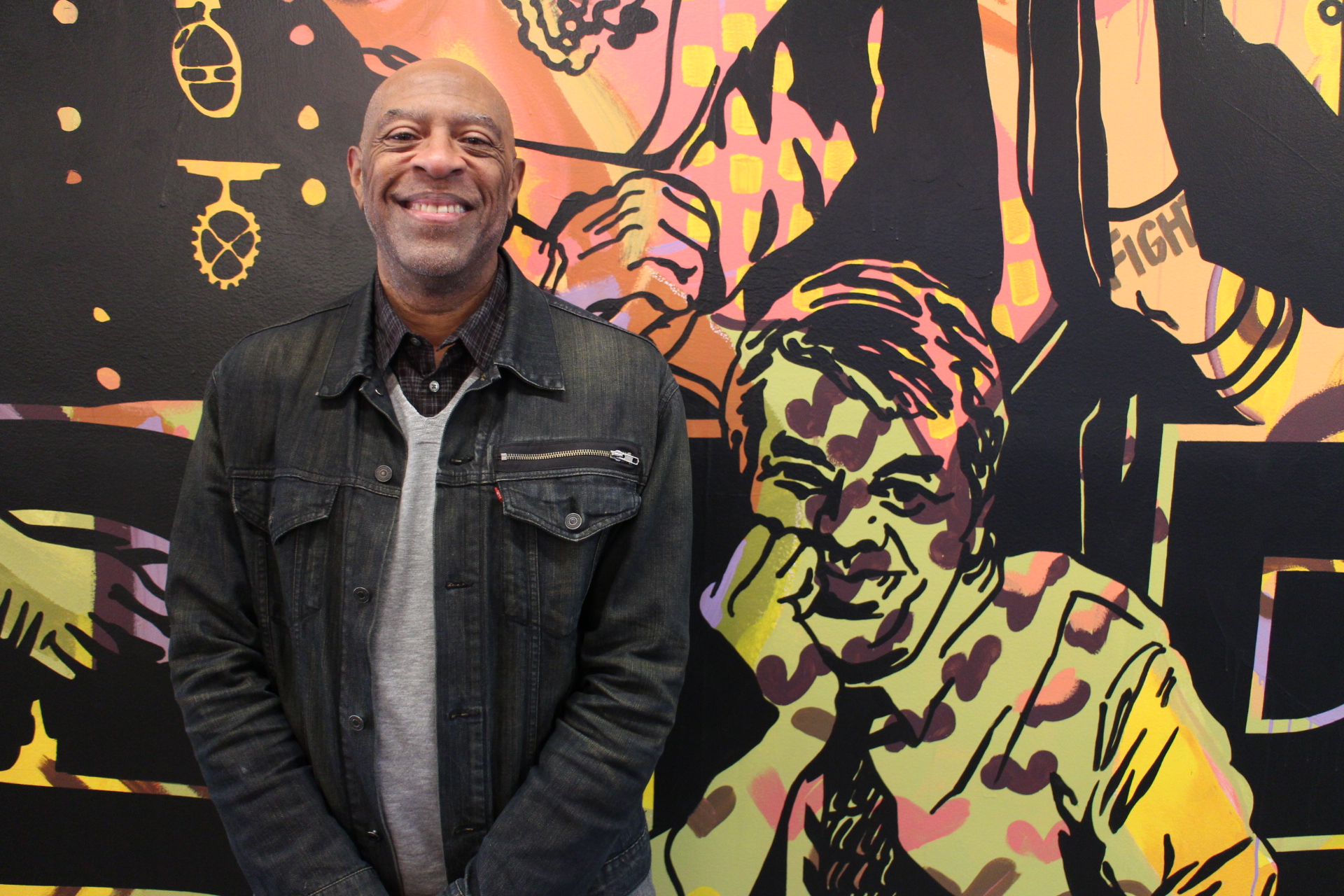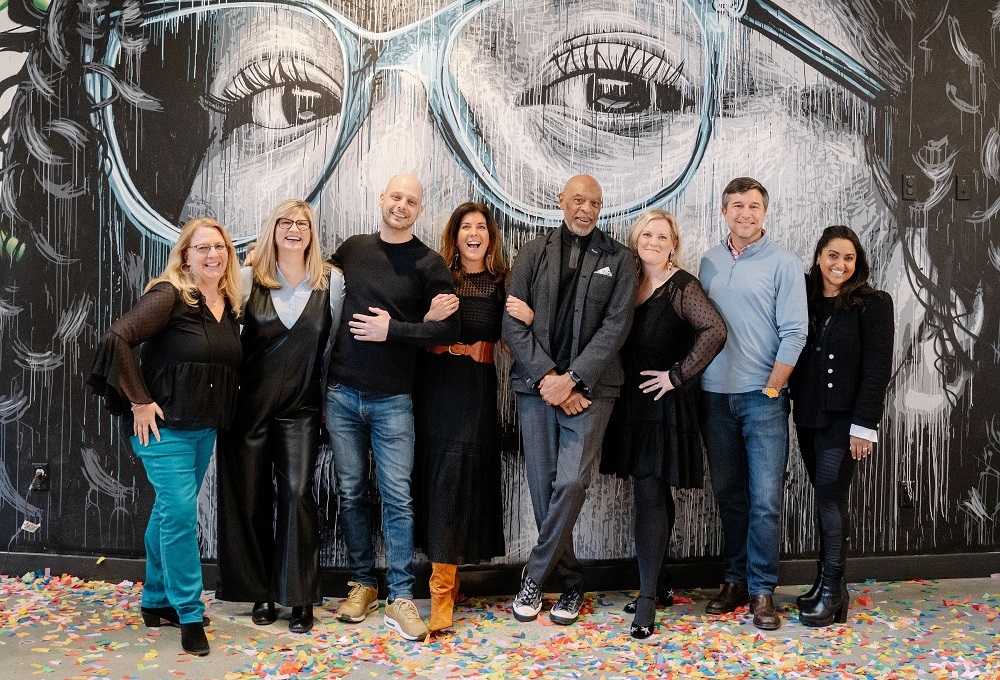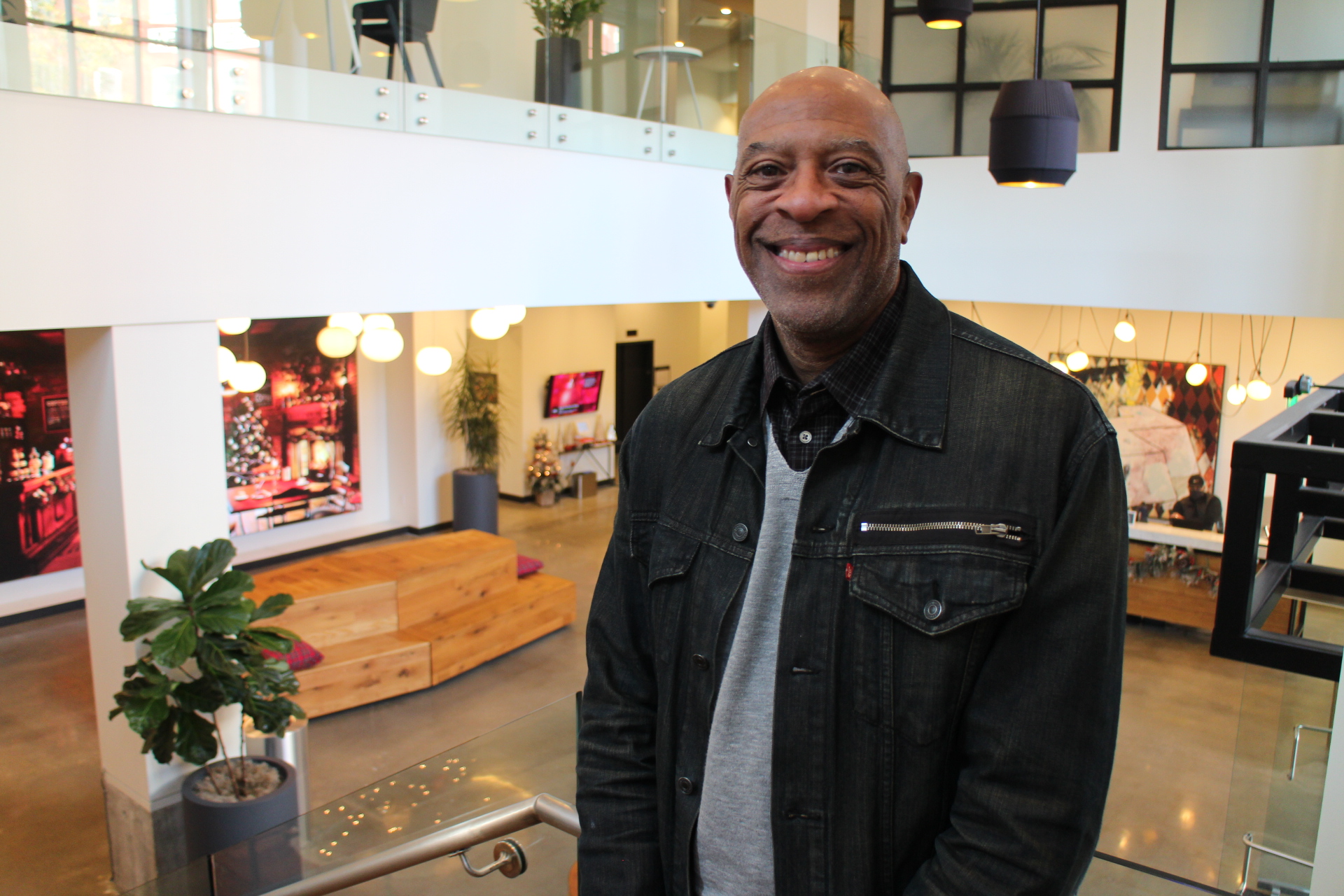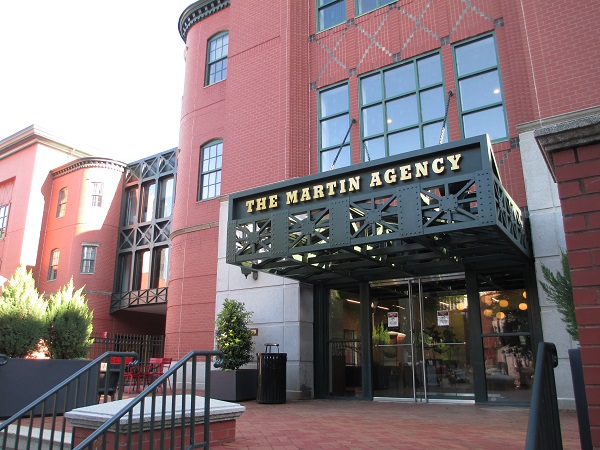
Danny Robinson, Martin Agency’s chief creative officer, beside a mural in its offices with an image of Mike Hughes, the late creative director who recruited him to the agency. (Jonathan Spiers photos)
When Adweek named The Martin Agency its 2021 U.S. Agency of the Year, making it one of three ad agencies in the history of the nearly 40-year-old award to win back-to-back years, Danny Robinson said he had one thing on his mind: threepeat.
Martin’s chief creative officer since mid-2020, when its adjustments to COVID helped garner the first of the two awards, Robinson said he knew the Richmond ad giant had to win it a second time, just like he knows now that it has to do it yet again.
An executive with Martin for 17 years, Robinson was recruited to the company by Mike Hughes, the late Martin creative director and president. Hughes had taken a liking to a 2002 U.S. Tennis Association ad Robinson helped create at his previous agency, New York-based Vigilante.
Robinson’s credits at Vigilante included helping to develop the now-famous Pontiac giveaways on The Oprah Winfrey Show, immortalized by the host’s “You get a car!” refrain. At Martin, Robinson’s work as a group creative director touched on accounts such as Walmart, Chevrolet, Tic Tac and Oreo.
After a two-year stint as chief client officer, a new-to-Martin role that was created just for him, Robinson broke ground in 2020 as the agency’s first black chief creative officer when he was named to succeed Karen Costello, its first female in the role.
BizSense sat down with Robinson in the weeks following Adweek’s announcement in December to discuss his latest role with the agency, why he believes the company has to channel its inner Michael Jordan and the origins of its popular “Scoop! There it is!” ad for Geico. The following is an edited transcript:
Richmond BizSense: Congrats on the Adweek recognition – again. Were you surprised to repeat? CEO Kristen Cavallo has said you all weren’t expecting to win it a second year in a row.
Danny Robinson: I was. (laughs) I wrote an email in February 2021 about repeating. I never sent the email out, but the start of it was about Michael Jordan’s threepeat (with the Chicago Bulls), and that I believe that Jordan is the kind of player that after he won the first championship, all he was thinking about was the next one.
I felt the same way when we won the first one: I’m not going to care in a week; it’s not going to mean anything to me. I was saddened by that, because I wanted to be able to feel great about it. But I knew that in a week, I’d be: “That’s great, but if we don’t win again, it could be called a fluke or luck, or it’s 2020 and doesn’t count.” There are so many reasons to say why that wasn’t real. So, in my mind, we had to win again. And not two years later but right after.
And I feel the same way now. We had a staff meeting last week and I stood in front of the agency and said we’re going to have to win again, and my job is to then help explain how. I have an idea about how; I’m not going to talk about that idea to anyone, because I don’t want anyone outside of here to know what the goal is.
RBS: Why is threepeating so important?
DR: I know this business. Since I’ve been here, I’ve seen great agencies fall. That’s scary. I mean really great agencies. I don’t mean disappear, but (it’s like) the Bulls are not Jordan’s Bulls today. My goal is to not let that happen. And luckily, I work with people who like to do good work.
RBS: The Adweek recognition noted certain accomplishments over the past year but highlighted one Martin ad in particular: the Geico “Scoop! There it is!” spot with hip-hop group Tag Team. Some people might think, “That was easy, you just throw in a pop culture reference and people will turn their heads.” But how did that idea come together and why do you think it worked?
DR: I would say to the person that says that: there are 100 examples of brands that have taken some pop culture reference from the ’80s and ‘90s and put it on a commercial, and the result is not the same. So, it isn’t that easy, obviously.
That idea started from a campaign that was already out in the world: “What are you waiting for?” That idea had been seeded, and there was really good work. You could have argued that the DJ Khaled or John Stamos ones could have taken off in the same way. They didn’t. People liked them, but it wasn’t the same as “Scoop.” Why that one? Nobody knows that.
I do have a theory about the timing of that commercial. It was 2020; most of the ads and communication from brands in 2020 were pretty somber: “We’re there for you in these difficult times,” a lot of that COVID-related language, commercials with people with masks to be responsible. And then there’s this commercial that was just pure joy, at a time when people absolutely needed some joy, needed to be able to smile and laugh.
It was “Soup! There it is” at the beginning. I think the story is the Tag Team guys said, “What are we going to do with soup? I don’t think that’s right.”
RBS: How was it that you replaced Karen Costello as chief creative officer?
DR: She actually made the call. She called me and told me she was leaving, then she asked if I would take over the position.
I thought about the options: “If not me, who?” And someone (from) outside, now, would probably not be the best thing. I knew I would have the support of Kristen and (Martin leadership), and I hoped that I’d have the support of the people under me in the department, knew that I was one of them.

Robinson with CEO Kristen Cavallo, center, and the rest of Martin’s leadership team when they were celebrating their latest Adweek recognition. (Courtesy of The Martin Agency)
RBS: What’s been your approach to the role? What new ideas have you brought to the table and implemented?
DR: One of the things I saw that I thought was making it difficult for us to do our best work is, the way the department is structured, creators work on a lot of things. It’s almost never that there’s a creative team that’s working on one account and nothing else. As a result, people could bounce around from client to client (and from team to team).
So, I split the department into thirds. Each (third) has an executive creative director, and they have a set of accounts that they’re responsible for. They can work within those groups up and down, but what I tried to avoid was the moving over to another group. The short of it is the ability for those creative leaders to really have a line of sight to all the people who are working and be able to help manage their time.
I think it’s helped. I always see my job as a bulldozer, to move things out of people’s way so they can do their best work. It’s that and asking the right questions.
RBS: What’s your take on Richmond’s ad scene? Are there other shops in town whose work you admire?
DR: Cabell (Harris, of Work Labs). The work that comes out of Work design-wise is consistently superior stuff. They take on assignments and always do really great in-depth design. He’s just been consistently good.
And Arts & Letters. I mean, we have an adversary… I love that they came, I love that they opened shop, because I like rivalries. There’s no McEnroe without Borg; there’s no Bird without Jordan, and vice versa. I love that they brought some competitive spirit, that we are also attracting talent to Richmond — not just Martin but Arts & Letters, we’re bringing people here — and I think their success is our collective success. The more…not the merrier… The more, the better.
RBS: It sounded like you started to say you have an adversarial relationship.
DR: They are competitors. We’re not necessarily going after the same clients, but we’re going after the same kind of talent, and we want to be the best in the city. I think competition makes people better. And we know them. We’re friends, we talk to them. We sent them congratulation notes when they win, they sent us notes back.
We’re “frenemies.” We’re not adversaries, we’re frenemies.

Danny Robinson, Martin Agency’s chief creative officer, beside a mural in its offices with an image of Mike Hughes, the late creative director who recruited him to the agency. (Jonathan Spiers photos)
When Adweek named The Martin Agency its 2021 U.S. Agency of the Year, making it one of three ad agencies in the history of the nearly 40-year-old award to win back-to-back years, Danny Robinson said he had one thing on his mind: threepeat.
Martin’s chief creative officer since mid-2020, when its adjustments to COVID helped garner the first of the two awards, Robinson said he knew the Richmond ad giant had to win it a second time, just like he knows now that it has to do it yet again.
An executive with Martin for 17 years, Robinson was recruited to the company by Mike Hughes, the late Martin creative director and president. Hughes had taken a liking to a 2002 U.S. Tennis Association ad Robinson helped create at his previous agency, New York-based Vigilante.
Robinson’s credits at Vigilante included helping to develop the now-famous Pontiac giveaways on The Oprah Winfrey Show, immortalized by the host’s “You get a car!” refrain. At Martin, Robinson’s work as a group creative director touched on accounts such as Walmart, Chevrolet, Tic Tac and Oreo.
After a two-year stint as chief client officer, a new-to-Martin role that was created just for him, Robinson broke ground in 2020 as the agency’s first black chief creative officer when he was named to succeed Karen Costello, its first female in the role.
BizSense sat down with Robinson in the weeks following Adweek’s announcement in December to discuss his latest role with the agency, why he believes the company has to channel its inner Michael Jordan and the origins of its popular “Scoop! There it is!” ad for Geico. The following is an edited transcript:
Richmond BizSense: Congrats on the Adweek recognition – again. Were you surprised to repeat? CEO Kristen Cavallo has said you all weren’t expecting to win it a second year in a row.
Danny Robinson: I was. (laughs) I wrote an email in February 2021 about repeating. I never sent the email out, but the start of it was about Michael Jordan’s threepeat (with the Chicago Bulls), and that I believe that Jordan is the kind of player that after he won the first championship, all he was thinking about was the next one.
I felt the same way when we won the first one: I’m not going to care in a week; it’s not going to mean anything to me. I was saddened by that, because I wanted to be able to feel great about it. But I knew that in a week, I’d be: “That’s great, but if we don’t win again, it could be called a fluke or luck, or it’s 2020 and doesn’t count.” There are so many reasons to say why that wasn’t real. So, in my mind, we had to win again. And not two years later but right after.
And I feel the same way now. We had a staff meeting last week and I stood in front of the agency and said we’re going to have to win again, and my job is to then help explain how. I have an idea about how; I’m not going to talk about that idea to anyone, because I don’t want anyone outside of here to know what the goal is.
RBS: Why is threepeating so important?
DR: I know this business. Since I’ve been here, I’ve seen great agencies fall. That’s scary. I mean really great agencies. I don’t mean disappear, but (it’s like) the Bulls are not Jordan’s Bulls today. My goal is to not let that happen. And luckily, I work with people who like to do good work.
RBS: The Adweek recognition noted certain accomplishments over the past year but highlighted one Martin ad in particular: the Geico “Scoop! There it is!” spot with hip-hop group Tag Team. Some people might think, “That was easy, you just throw in a pop culture reference and people will turn their heads.” But how did that idea come together and why do you think it worked?
DR: I would say to the person that says that: there are 100 examples of brands that have taken some pop culture reference from the ’80s and ‘90s and put it on a commercial, and the result is not the same. So, it isn’t that easy, obviously.
That idea started from a campaign that was already out in the world: “What are you waiting for?” That idea had been seeded, and there was really good work. You could have argued that the DJ Khaled or John Stamos ones could have taken off in the same way. They didn’t. People liked them, but it wasn’t the same as “Scoop.” Why that one? Nobody knows that.
I do have a theory about the timing of that commercial. It was 2020; most of the ads and communication from brands in 2020 were pretty somber: “We’re there for you in these difficult times,” a lot of that COVID-related language, commercials with people with masks to be responsible. And then there’s this commercial that was just pure joy, at a time when people absolutely needed some joy, needed to be able to smile and laugh.
It was “Soup! There it is” at the beginning. I think the story is the Tag Team guys said, “What are we going to do with soup? I don’t think that’s right.”
RBS: How was it that you replaced Karen Costello as chief creative officer?
DR: She actually made the call. She called me and told me she was leaving, then she asked if I would take over the position.
I thought about the options: “If not me, who?” And someone (from) outside, now, would probably not be the best thing. I knew I would have the support of Kristen and (Martin leadership), and I hoped that I’d have the support of the people under me in the department, knew that I was one of them.

Robinson with CEO Kristen Cavallo, center, and the rest of Martin’s leadership team when they were celebrating their latest Adweek recognition. (Courtesy of The Martin Agency)
RBS: What’s been your approach to the role? What new ideas have you brought to the table and implemented?
DR: One of the things I saw that I thought was making it difficult for us to do our best work is, the way the department is structured, creators work on a lot of things. It’s almost never that there’s a creative team that’s working on one account and nothing else. As a result, people could bounce around from client to client (and from team to team).
So, I split the department into thirds. Each (third) has an executive creative director, and they have a set of accounts that they’re responsible for. They can work within those groups up and down, but what I tried to avoid was the moving over to another group. The short of it is the ability for those creative leaders to really have a line of sight to all the people who are working and be able to help manage their time.
I think it’s helped. I always see my job as a bulldozer, to move things out of people’s way so they can do their best work. It’s that and asking the right questions.
RBS: What’s your take on Richmond’s ad scene? Are there other shops in town whose work you admire?
DR: Cabell (Harris, of Work Labs). The work that comes out of Work design-wise is consistently superior stuff. They take on assignments and always do really great in-depth design. He’s just been consistently good.
And Arts & Letters. I mean, we have an adversary… I love that they came, I love that they opened shop, because I like rivalries. There’s no McEnroe without Borg; there’s no Bird without Jordan, and vice versa. I love that they brought some competitive spirit, that we are also attracting talent to Richmond — not just Martin but Arts & Letters, we’re bringing people here — and I think their success is our collective success. The more…not the merrier… The more, the better.
RBS: It sounded like you started to say you have an adversarial relationship.
DR: They are competitors. We’re not necessarily going after the same clients, but we’re going after the same kind of talent, and we want to be the best in the city. I think competition makes people better. And we know them. We’re friends, we talk to them. We sent them congratulation notes when they win, they sent us notes back.
We’re “frenemies.” We’re not adversaries, we’re frenemies.

